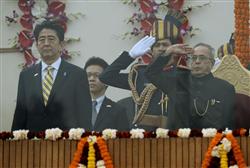 Source: sankei.co.jp
Source: sankei.co.jp Certainly the prospect of increased ties between two of the most prominent, non-Chinese powers in the Asia-Pacific have prompted both PM Abe and PM Singh to explore bilateral co-operation across a range of areas to both profit from the amicable relations both nations share, and to provide a preliminary insurance against threat to the territorial integrity of both countries posed by China. The fact that India possesses its own independent military forces and functions as a democratic state with a burgeoning population, many of whom aspire to middle class status, makes it ideal for a Japan that is searching for an outlet for its infrastructure and technology sectors. Nevertheless, there are inherent risks, not the least of which is the very fact that India is still suffers from endemic levels of poverty, has an overburdened infrastructure in need of replacement, is periodically subject to ethnic, social and religious disputes (and a continuing dispute with its northern neighbour Pakistan) , and suffers from a prevalence of corruption may all give Japanese policy makers pause for thought. Yet given the significance of India to the region and the latent potential that India possesses, Abe has made India a core focus of his foreign policy, and further bilateral visits can be expected.
While Abe was concentrating on India on the weekend, last week he was partaking in the annual World Economic Forum in Davos, Switzerland. Following his speech to assembled members where he essentially lauded the achievements of Abenomics (J), Abe addressed the foreign media, where he was later reported by the BBC and Financial Times as having compared the current relationship of Japan and China to that of Germany and Britain before the outbreak of WWI. Leaving aside the fact that historical analogies almost always don’t work, given the myriad of mitigating factors that led to an event occurring in the first place, Abe does appear to have attempted to draw attention to the situation in Europe in 1914 as an example of how not to handle rising tensions, or at least an example of a fate that Asia should and can avoid. Abe’s gripe (if it can be called that) is the refusal by China to be transparent in its intentions, and that in the absence of any guarantees by China to adhere to the rule of law and explain the increases in its defence spending makes its neighbours nervous.
The interplay of regional agreements that Abe has forged certainly resembles those of pre-WWI Europe, but one has to remember that Abe is predominantly offering economic assistance to other states and has given no assurances of military or other security related support. While Japan has certainly shown interest in creating ties with countries in order to explore defence technology (namely France and Britain), it has not committed itself to any greater defence cooperation than that which already exists with its principal ally, the United States. If anything, Abe wishes to retain the status quo, and that means not increasing Japan’s defence commitments except in defence of the Japanese home territories (which rules out the idea of greater involvement by Japan in its UN mission in Africa, or elsewhere for that matter). While commentators could suggest that Abe was deliberately provoking China by bringing up 1914, his rhetoric was not that of someone bent on confrontation. Abe is no dove, but he is a realist and knows that economic development and trade are the keys to regional stability and political longevity. If he must criticise other nations to ensure that the established order is not disturbed, he will do so. But Abe knows that co-operation is paramount in the current regional atmosphere, and will pursue foreign policy goals to that end.
 RSS Feed
RSS Feed